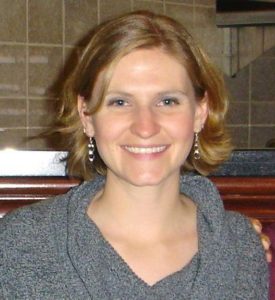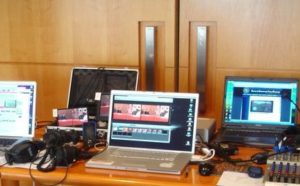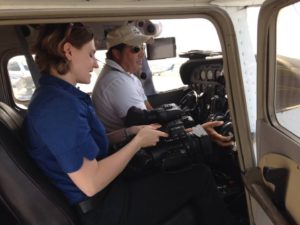Q&A With Professional Editor Erica Jaffe
At the start of this month, some Newhouse students took trips to meet professionals in the industries in which they want to work, namely on the coastlines. A few hit smaller markets as some of us will eventually be working in them. There’s something to be said about mid-level markets, though, as Erica Jaffe can attest to.
A professional editor and owner of Staccato Productions, a company that works on corporate videos in Denver, CO, she answered questions recently about how she got to where she is, and offered some advice and both advantages and disadvantages in the field that we can contemplate as we start to apply for internships and jobs.
Why did you decide to become an editor?
I’ve always been fascinated with video… being able to capture real life and play it back, and not only play it back in its original form, but also to be able to manipulate what you see. I’ve also always been really good with technology, and have a very creative side, so a natural mix of all those things lead me to become a corporate marketing editor.
What was your first job and how did it lead to where you are today?
My first official editing job was as a freelancer for a guy named Keith Singer, who at the time, was working with a company called Jones University. Jones had several different departments and we used to put together videos for all of them. There was a radio station within Jones, so we put together TV spots for the radio station; there was a cable installation department that we made training videos for; and Jones had a little studio with a green screen, so we’d put together internal communications videos. It was a good variety of videos to edit, so I gained a lot of skills that would help me in the future, like how to edit green screen footage, how to make broadcast-ready spots, and how to digitize footage for a number of different sources. They also used editing software that I was not familiar with, so the tech geek within me loved teaching myself new software. I learned that it’s more important as an editor to know how to tell a story, rather than to know the tools (software) to put it together. Technology will always be changing (and you can always re-learn the software), but the ability to know how to effectively tell a story through video will never change.
What do you love most and least about your job?
I love being able to help people craft messages and reach their audiences through the power of video. I’m often inspired first, by music. So my favorite thing is when I find a perfect music track that I can match visuals up with to help bring a story to life.
My least favorite thing about being an editor is when people just assume that it’s easy to “fix it in post” and cut corners during production. Luckily this doesn’t happen very often.
A lot of professionals are now recommending that those obtaining TV/film degrees know editing in some form or fashion even if they’re not going to be an editor. What advantages do you feel an editing background has to someone who may not want to be a professional editor in the future?
I think it’s important for people to understand how their story will be brought to life, and thinking like an editor does just that. Thinking like an editor, in my opinion, doesn’t mean that you know the software or anything, it means that you’re paying attention to things like, “Is there enough b-roll? Did I film enough of a variety of shots to be able to get my message across? Did I film establishing shots to set the scene? If I interview a person facing camera right, maybe the next interview should be facing camera left, so they aren’t all facing the same direction. Was there traffic noise being heard during an interview? If so, then let’s establish it by filming some shots of traffic.”
If you can anticipate the questions you may get during post-production and address them during production, your overall product is just going to turn out that much better.
As a freelancer, what are some of your best networking tips?
- You never know where your next job is going to come from, so always present yourself in a professional manner
- Be honest
- Get involved with professional organizations in your area
- Join Facebook groups in your industry… You may not directly get jobs from it, but it’s a good resource and you’ll learn a lot about what’s happening
What are some advantages and disadvantages of having your own business?
It’s nice to be able to work when you want to work, as long as your deadlines are met and it’s nice to talk directly with my clients. It’s also nice to establish expectations up front.
With technology now, my clients don’t really ever sit in with me as I edit their videos, so being alone in my edit suite working on big projects can get kind of lonely.
You work in a smaller market that is not New York or Los Angeles, what do you feel are the advantages of that?
I think the advantage of a smaller market is that people tend to know each other and my name gets passed around a lot more I think than it would in a bigger market. Plus, there’s less competition.
Premiere seems to be the go-to for professional editors now (still a bit of AVID in TV) but mostly Premiere. What is your opinion on that program?
No editing software is ever going to be perfect, but Premiere seems to have the most things figured out. It’s still quirky in its own way, but overall, I love the integration with other Adobe products, and I love the fact it is cross compatible on both PCs and MACs. The program itself works great, as long as you have a decent computer to run it on.
Coming out of any college program – graduate, undergraduate or otherwise, what is your takeaway of obtaining a higher degree in a creative field that’s not necessarily related to the job itself, but in learning and professional relationships?
I think it’s more important to have an understanding of bigger picture things, rather than focusing on the details. And it’s really super important to network and take advantage of your school’s career services department. Some advice that I was given as a college graduate was to find the job you really want to do, find someone at a company that does that job, and call them. Tell them that you’d like to take them to lunch and pick their brain about their journey to getting there. I think, especially in creative fields, it’s all about who you know. As a young, eager, recent graduate, I never had anyone turn down my offer to take them to lunch – and I took several people to lunch – and eventually, I found an ‘in’ into the industry. The rest is history! People like telling the story of how they got to where they are and in my experience, are proud of it and have no problem sharing it with someone who wants to be them in the future.
As most of our guest speakers stated in our January term, relationships are the most beneficial no matter what area you’re planning to work in and being multi-faceted doesn’t hurt either. Not only does Erica edit, but she shoots as well. These talents allow to not only have her hand in a variety of fields but to travel the country as well doing what she loves.


